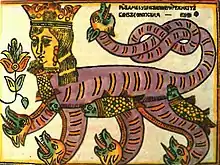Meduza (Russian folklore)
Meduza (Russian: Медуза), Meluza (Russian: Мелуза, literally «small», «little») or Meluzina (Russian: Мелузина) is a mythical creature in Russian folklore. She was depicted in a Russian lubok of the 17th or 18th century. She is described as half-woman, half-snake, or as the half-woman, half-fish creature.[1][2] She is also said to be the deity of deception.[3]

Appearance
She is represented as a sea monster with the head of a beautiful dark-haired maiden, having the body and belly of a striped beast, a dragon tail with a snake's mouth at the end, and legs resembling those of an elephant with the same snake mouths at the end. She also wears a crown.
According to belief, her snake mouths contained a deadly dragon poison. She was said to live in the Sea near the Ethiopian abyss, or in the West Ocean.[1][4]
References
- Belova 1999, p. 175.
- Belova, Petruhin 2008, p. 180—181.
- Bychkov Andrey Alexandrovich. Encyclopedia of Pagan gods. Myths of Early Slavs. Online books
- Damskiy 1801, p. 143—144.
Sources
- Belova, Olga Vladislavovna (1999). Славянский бестиарий: словарь названий и символики [Slavic Bestiary: a dictionary of names and symbols] (in Russian). Indrik. ISBN 5-85759-100-7.CS1 maint: ref=harv (link)
- Belova, Olga Vladislavovna, Petruhin (2008). Фольклор и книжность: Миф и исторические реалии [Folklore and bookishness: Myth and historical realities] (in Russian). Science. p. 263. ISBN 978-5-02-036228-4.CS1 maint: ref=harv (link)
- Damskiy, Kipriyan (1801). Любопытный словарь естеств животных [Curious Dictionary of the Natures of Animals] (in Russian). Тип. Ф. Мейера. p. 234.CS1 maint: ref=harv (link)